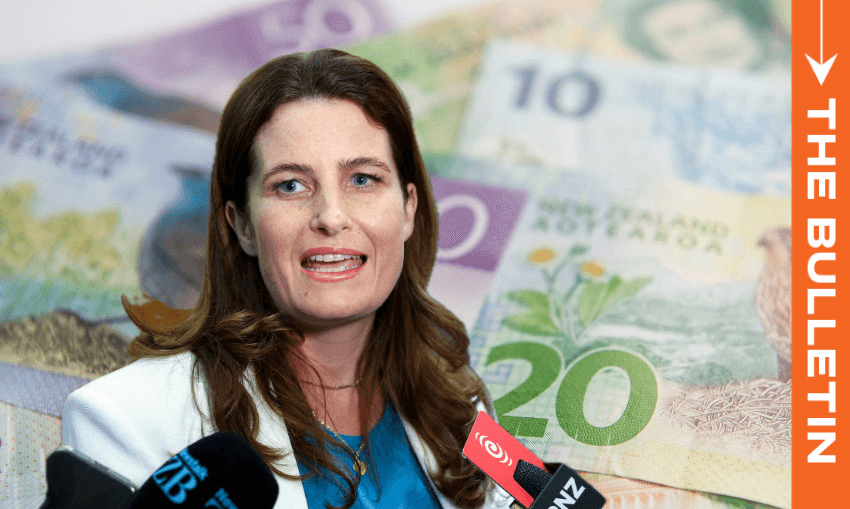The success of the tax package is hugely important for the coalition government, but especially National, writes Stewart Sowman-Lund in today’s extract from The Bulletin.
To receive The Bulletin in full each weekday, sign up here.
It’s tax cut week
From tomorrow, income tax brackets will be adjusted in line with the plan outlined by the coalition government back in its May budget. Or, in other words, tax cuts (and a new FamilyBoost childcare rebate) are finally here. This 1News explainer breaks down what you can expect this week, with roughly 3.5 million people set to benefit. It’s been in the pipeline for a long time – a similar proposal was first outlined by National back in mid-2022. Since then, throughout an election campaign, the formation of a three-party coalition and intense scrutiny over the cost, the tax cut promise has largely survived, with some minor jiggles such as retaining (and not reducing) the top tax bracket. “We hear the pleas of struggling Kiwis and we say: ‘National has your back’,” said Nicola Willis, then finance spokesperson, in August 2022.
Those words were echoed almost verbatim yesterday by the prime minister Christopher Luxon and Willis – except this time it’s the “government” that has your back – as they gave the weekly post-cabinet press conference. In short, there’s a lot riding on this.
The landscape in which tax cuts land
The tax cuts were pitched to voters as cost of living relief, but they’re kicking in as things start to cool down. The Herald reported on the latest household inflation figures before the weekend, noting that while it was still up 5.4% in the June quarter, that was a drop off from a peak of 8.2% at the end of 2022. The state of the wider economy appears to be looking up as well, with The Post’s Tom Pullar-Strecker reporting on claims by Kiwibank that traders believe the official cash rate could be slashed by 75 basis points by the end of November, a pivot from recent expectations that it wouldn’t be until next year before interest rates were lowered.
At the supermarket, food prices, which have one of the most immediate impacts on family budgets, have started to drop too. As things become less gloomy, might the government attract less attention than it once would have for its long-awaited tax cut package? Possibly, with Liam Dann at the Herald (paywalled), going as far as to describe a mood of “economic optimism”, though caveating that by saying “we’re still in a downturn and it still sucks”. In The Post today, Luke Malpass argued that while the tax cuts were once key to the government’s economic plans, it could be the impending rates cuts that earn them the biggest plaudits (even if it’s, partly, just a matter of good timing).
What this means for the government
As mentioned up top, there’s a lot riding on the tax cut package. It’s no longer just National policy, but coalition government policy. That means while it differs from the proposals put forward in the campaigns by Act and New Zealand First, they too will be held accountable. But National would bear the biggest brunt of any ill feeling. Even as the cost of living eases, the limited polling data available suggests tax cuts are a popular move. A Taxpayers’ Union Curia poll reported by the Herald’s Thomas Coughlan in April showed 53% of those surveyed wanted a tax cut, while 29% didn’t. Shortly before last year’s election, a Newshub Reid Research poll provided a similar response – 51% wanted tax cuts, and the policy was more popular than Labour’s pledge to dump GST from fruit and vegetables. So we know tax cuts were, as recently as April, a reasonably well-supported measure. As Interest’s Dan Brunskill wrote yesterday, however, there is a challenge for the government: keeping voters convinced of that. Given the tax cuts come amid public sector cuts, finance minister Nicola Willis will need to prove that a little bonus each pay day is worth it.
Labour does its own math
We already know that Labour is against cutting taxes in the current environment. As mentioned, their cost of living proposal in the election was around GST rather than income tax. Following budget day, leader Chris Hipkins urged followers to donate their tax cut to his party. Now that tax cuts are about to become a reality, Labour will be stepping up its attacks on the government. The party’s finance spokesperson Barbara Edmonds has tallied up the costs the coalition has reinstated, such as on prescriptions, and argued families will be worse off even after pocketing their tax cuts. “Kiwis have been sold a lemon with the National Party promising a lot but delivering peanuts for most people,” she said. Writing for The Spinoff in April, Shanti Mathias did some maths as well, looking at whether people will end up spending their tax cuts on public transport that, until May, had been discounted. In her scenario, a 23-year-old on the minimum wage using public transport 10 times a week would be worse off.


